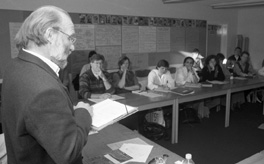The new Creative Writing Course
Peter Abbs, course convenor, writes:
There is a stir of anticipation in the Institute of Education this year as over twenty new students come into the Language, Arts and Education programme to pursue the Creative Writing course it now offers. The students will do some critical writing but the main dessertation submissions will be directly expressive in character: poetry, autobiography, novels, stories, drama, film and TV scripts.
 The Language, Arts and Education MA has been running a highly successful course for over fourteen years but it has only recently broadened its submission to include a portfolio of Creative Writing showing work in two genres. Experience has already shown that in a lively and supporting context work of a high order can be achieved. In 1995 Elizabeth Fincham won the University of Sussex Robin Lee Poetry Prize while this year Wendy Moore received a commendation - both were LAE students. This summer another student, Nargis Walker, was one of the winners of the much publicised national Asham Award for new writing by young women. Such achievement promises well for the new Creative Writing programme.
The Language, Arts and Education MA has been running a highly successful course for over fourteen years but it has only recently broadened its submission to include a portfolio of Creative Writing showing work in two genres. Experience has already shown that in a lively and supporting context work of a high order can be achieved. In 1995 Elizabeth Fincham won the University of Sussex Robin Lee Poetry Prize while this year Wendy Moore received a commendation - both were LAE students. This summer another student, Nargis Walker, was one of the winners of the much publicised national Asham Award for new writing by young women. Such achievement promises well for the new Creative Writing programme.
The tutors on the course are committed to establishing a fertile relationship between the power of critical ideas and the life of the imagination. The course convenor is known for his work on aesthetic education and is a published poet; Trevor Pateman is academically well regarded for his work on language and aesthetics but is also a writer of fiction; Celia Hunt who has established the Certificate in Creative Writing at CCE and is making a doctoral study of the relationship between self and autobiography has now joined the LAE team. The course also has direct access to many nationally established writers and performers including Maggie Gee, Stuart Hood, Nicki Jackowski, Jane Lapotaire and Laurence Lerner.
There is a further feature which makes the Creative Writing programme rather special. All students are placed in a context that crosses the arts. This means that for the writer many kinds of artistic experimentation are possible. Poetry can be set to music. Stories can be illustrated. Novels can be dramatised or converted to video or film. We are offering an education not only in writing but also in the Arts and the philosophy of the Arts. In such a broad and demanding context we confidently expect the writers of the future to emerge.